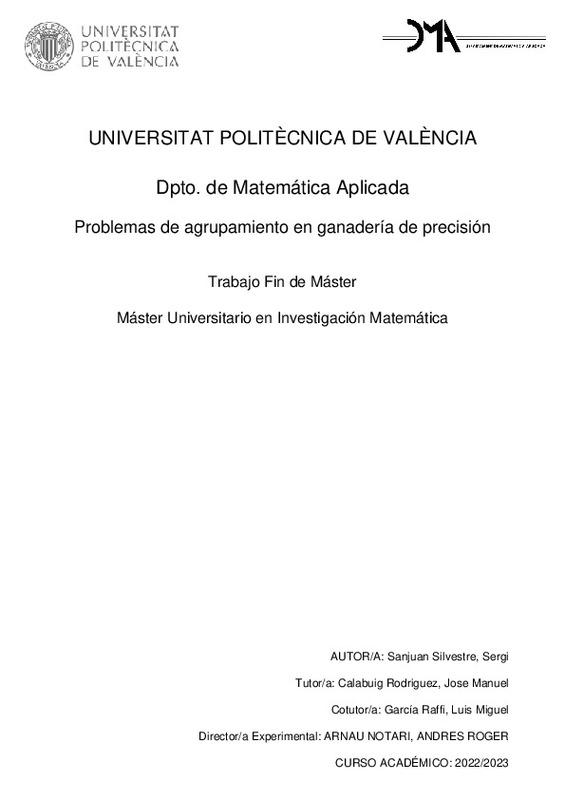|
Resumen:
|
[ES] La ganadería de precisión es una técnica moderna que utiliza tecnología avanzada, como sensores, dispositivos de seguimiento y análisis de datos, para monitorear y administrar de manera eficiente la cría y el manejo ...[+]
[ES] La ganadería de precisión es una técnica moderna que utiliza tecnología avanzada, como sensores, dispositivos de seguimiento y análisis de datos, para monitorear y administrar de manera eficiente la cría y el manejo de animales de granja. Este trabajo consiste en una aplicación de esta técnica a terneras de ganadería no extensiva. Para esto, se ha hecho uso de modelos matemáticos de inteligencia artificial para maximizar la eficiencia, la salud y el bienestar de las terneras pertenecientes a este tipo de granjas, donde no se cuenta con muchos animales.
Este estudio cuenta con el respaldo de dos proyectos de gran magnitud: Re-livestock y TED-Farm, cuyos objetivos se centran en mejorar la gestión y el rendimiento de las operaciones ganaderas, al tiempo que se promueve la salud y el bienestar animal. Estos proyectos nos han proporcionado valiosos datos sobre las actividades de cada animal en un tiempo determinado, así como el grupo alimenticio de cada animal: terneras de $2$ tomas, de $3$ tomas o destetadas. De este modo, el objetivo principal de este estudio es clasificar estas terneras por su grupo alimenticio mediante sus actividades diarias, el cual ha proporcionado resultados prometedores. Como segundo y último objetivo, se pretende predecir las actividades que realizará una ternera perteneciente a un determinado grupo.
Para lograr estos objetivos, se emplean múltiples métodos y algoritmos de aprendizaje automático. Estos métodos se detallan a lo largo del documento, y se proporciona un apéndice al final que ofrece una explicación más detallada de estos métodos, incluyendo pruebas matemáticas y herramientas utilizadas en el estudio.
[-]
[EN] Precision livestock farming is a modern technique that utilizes advanced technology such as sensors, tracking devices, and data analysis to efficiently monitor and manage the breeding and handling of farm animals. ...[+]
[EN] Precision livestock farming is a modern technique that utilizes advanced technology such as sensors, tracking devices, and data analysis to efficiently monitor and manage the breeding and handling of farm animals. This work involves the application of this technique to intensively raised calves. To achieve this, mathematical models of artificial intelligence have been used to maximize the efficiency, health, and welfare of calves in these types of farms with a limited number of animals.
This study is supported by two large-scale projects: Re-livestock and TED-Farm, which aim to improve the management and performance of livestock operations while promoting animal health and welfare. These projects have provided valuable data on the activities of each animal over a specific time period, as well as the feeding group of each animal: calves with 2 feedings, calves with 3 feedings, or weaned calves. Thus, the main objective of this study is to classify these calves into their respective feeding groups based on their daily activities, which has yielded promising results. As a second and final objective, the intention is to predict the activities that a calf belonging to a specific group will perform.
To achieve these objectives, multiple methods and machine learning algorithms are employed. These methods are detailed throughout the document, and an appendix is provided at the end, offering a more comprehensive explanation of these methods, including mathematical proofs and tools used in the study.
[-]
|







